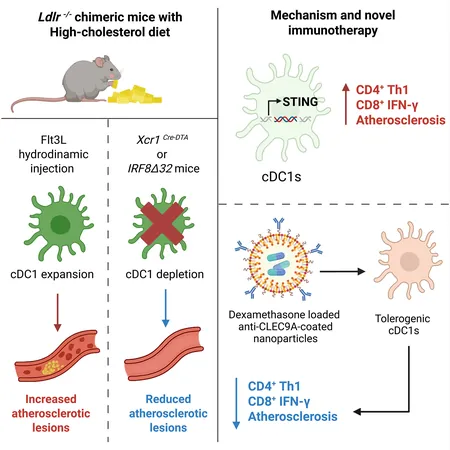
Breakthrough in Atherosclerosis: Immunosuppressive Nanoparticles Show Promise in Slowing Disease Progression
2025-06-02
Author: Mei
A Game Changer in Cardiovascular Health!
At the forefront of cardiovascular research, scientists at the Centro Nacional de Investigaciones Cardiovasculares Carlos III (CNIC) have made a groundbreaking discovery that could revolutionize how we treat atherosclerosis. Collaborating with top national and international research teams, they identified a crucial subtype of immune cells that contribute to the development of this chronic disease.
What Is Atherosclerosis?
Atherosclerosis is a chronic condition affecting millions globally, characterized by the buildup of cholesterol, particularly low-density lipoprotein (LDL), in arterial walls. This accumulation leads to plaque formation, which can restrict blood flow and, over time, rupture, resulting in life-threatening events like heart attacks and strokes.
The Immune System's Role Unveiled.
Traditionally viewed as a vascular issue, recent studies have turned the spotlight on inflammation and the immune response behind atherosclerosis. The CNIC team's latest research, led by the Immunobiology Group and spearheaded by David Sancho, has illuminated the significant role of conventional type 1 dendritic cells (cDC1s) in the inflammatory process driving this disease.
Key Findings Shed Light on Disease Progression.
Using genetically modified mice on a high-cholesterol diet to mirror atherosclerosis conditions, lead author Miguel Galán Burgos reveals some intriguing insights. By artificially increasing cDC1 numbers, arterial lesions worsened, but when these cells were absent, plaque formation dropped significantly, despite an unhealthy diet.
Nanoparticles: The Innovative Solution.
The study introduces an exciting experimental therapy—immunosuppressive nanoparticles tailored to target and suppress inflammation. Developed in collaboration with scientists from the CIC biomaGUNE in San Sebastián, these nanoparticles are loaded with dexamethasone and coated with antibodies specifically designed for cDC1s.
Promising Results in Animal Models!
Upon administration in animal models, these nanoparticles yielded remarkable results, significantly reducing plaque size and curbing the inflammatory response, all while maintaining the body's ability to fight off viral infections. This targeted strategy offers potential for safer, more effective treatments with fewer side effects.
A New Era for Cardiovascular Therapies.
This pioneering study not only reinforces the central role of cDC1s in atherosclerosis but also paves the way for future personalized immunotherapies. By targeting the underlying immune mechanisms, researchers are forging a promising path in the ongoing battle against cardiovascular diseases.
Conclusion: Hope on the Horizon!
As we stand on the brink of a new era in heart health, these findings exemplify the incredible synergy between molecular biology and materials engineering, holding the promise for tailored treatments that could change lives and save millions.


 Brasil (PT)
Brasil (PT)
 Canada (EN)
Canada (EN)
 Chile (ES)
Chile (ES)
 Česko (CS)
Česko (CS)
 대한민국 (KO)
대한민국 (KO)
 España (ES)
España (ES)
 France (FR)
France (FR)
 Hong Kong (EN)
Hong Kong (EN)
 Italia (IT)
Italia (IT)
 日本 (JA)
日本 (JA)
 Magyarország (HU)
Magyarország (HU)
 Norge (NO)
Norge (NO)
 Polska (PL)
Polska (PL)
 Schweiz (DE)
Schweiz (DE)
 Singapore (EN)
Singapore (EN)
 Sverige (SV)
Sverige (SV)
 Suomi (FI)
Suomi (FI)
 Türkiye (TR)
Türkiye (TR)
 الإمارات العربية المتحدة (AR)
الإمارات العربية المتحدة (AR)